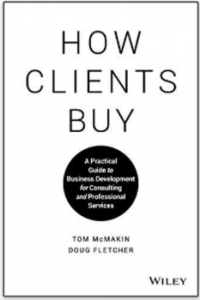The following is a guest post by Tom McMakin is the author of “How Clients Buy” (Wiley, 2017) and the CEO of Profitable Ideas Exchange (PIE). If you’d like to contribute a guest post to Money Q&A, be sure to check out our guest posting guidelines.

Most of us hate salespeople. They’re the bottom-feeders of commerce schooled in the art of deceit and manipulation. Think of The Wolf of Wall Street, Margin Call, and Glengarry Glen Ross. Was there a character in any of these movies who was anything other than craven and rapacious?
This is a problem if you are charged with growing a consulting or professional services practice. You need to sell or you will die and yet loathe the person you must become.
In a charitable moment, we might think they are a necessary evil at the car dealership and mall jewelry stores, but we’d be quick to say that there is no room for a salesperson in consulting or professional services. That is because we think our world is above salespeople. We “engage” with would-be clients. We don’t sell.
Every year Gallup Poll conducts a survey asking which professions are thought to be honest and ethical. Estimable professions include nurses, pharmacists, doctors, engineers, firefighters, and clergy. At the other end of things skulk Members of Congress, Senators, HMO managers and — you knew this was coming — salespeople. The lowest seven professions included car salespeople, insurance salespeople, advertising executives, and stockbrokers.
Most of us believe that sales is the practice of:
Causing someone to take an action they wouldn’t take if left to their own devices.
It’s no wonder we think of salespeople as odious and can’t imagine joining their ranks.
We think of sales lives at the intersection of:
- Wrong: Consulting and professional service providers feel like selling is inconsistent with their commitment to professional ethics. If selling is causing others to do what they might not do if left to their own devices and professionalism is doing what is best for the client at all times, then there is an inherent conflict between selling and being a professional.
- Ineffective: Top rainmakers in the consulting and professional services report that traditional sales techniques don’t work on their clients. Unlike the old door-to-door vacuum sales pitch perfected in the 1950s, no one dumps dirt on the carpet of a potential client’s office to demonstrate the effectiveness of their vacuum cleaner/digital transformation. We spoke with Jane Pierce who left ADM to start a consulting practice. She remembers what it was like to get calls from salespeople as a potential client. “I wouldn’t even take a call. I had a guard dog that blocked out all of those calls. I figured if I needed something, I’d go out and look for it. In the meantime, I didn’t have the time.”
- Difficult: Sales is hard work. Salespeople cold call, knock on the doors of people they don’t know, bear near-constant rejection. Finally, sales is out of our comfort zone. We know accounting, the law or IT security, not how to sell our services.
To put a cherry on all this, most of us harbor feelings that sales is déclassé and below us.
“I don’t want to just be called a salesman. To me, that is a woman at Lord & Taylor in a white blouse and black skirt helping you buy a pocketbook.”
Audrey Cramer, Vice Chairman, Cushman and Wakefield
We are told that people who have higher degrees manage salespeople. They are never salespeople themselves. Most professionals resolve the cognitive dissonance between the need to grow their business with the huge preponderance of reasons why sales are inappropriate to consulting and professional services practices by taking a hard line against sales.
Says Walt Shill, formerly of McKinsey and Accenture:
“A long time ago at McKinsey, before paved roads and electricity, we didn’t use the world sell. We didn’t even use the word sales. We recorded professional fees and so there was this view that clients have problems and we need to discover, understand and tackle them. And the way you do that is you build relationships and you demonstrate the capability to solve problems. And then once people realize you help them solve problems, then they will come back.”
I believe the historical aversion to the term selling has a lot to do with the fact that in professional services we are the product. Unlike others who may sell sophisticated software systems to the Fortune 500 or advanced imaging systems to large hospitals, we are selling ourselves. It seems boastful or distasteful to promote ourselves. We’ve been taught since kindergarten not to be a braggart.
There’s a strong, long-held cultural value system among the professional services that selling ourselves is unseemly. Promoting ourselves is too crass. Too commercial. Too hucksterish. Many, if not most, of us in professional services have felt this way at some point.
Which is why successful rainmakers at all professional services firms speak of the need not to sell feature and attributes, but instead to build trust and add value to potential clients in advance of the sale. Only then, will would-be clients begin to see you not as a salesperson but as a partner with whom they can work to solve a problem.
Tom McMakin is the author of “How Clients Buy” (Wiley, 2017) and the CEO of PIE, a marketing services firm focused on the professional services industry. He can be reached at tmcmakin@profitableideas.com


One thing some sales people need to be able to do is accept “no” as an answer – and move on to a customer that is going to say “yes.” Too often a salesperson will waste too much time trying to sell something to someone that neither wants nor needs it. A Kirby vacuum cleaner once spent the better part of an hour trying to convince me to buy his vacuum cleaner – and I didn’t even have carpet at the time! A car salesperson might be able to sell more cars if they don’t spend too much time pushing for that extended warranty. Which is better, selling ten cars in a day, two with extended warranties, or selling five cars with three extended warranties? (Granted, I pulled those numbers out of no where).
I see the points of this article but and absolutely agree to reframe the “selling” into a value proposition and solution-oriented approach towards the customer. This puts the sales person into a partner instead of a sales persons a la Wolf of Wall Street. I started my career in sales, fantastic experience however it was quite tough as well to always try to hit and surpass the company’s objectives. (Sometimes you would be pushed to sell a product just because the company needs to sell it, not because it is in the customer s best interest). I learned a lot from the experience and still always appreciate a professional salesman even though he clearly is trying to sell.